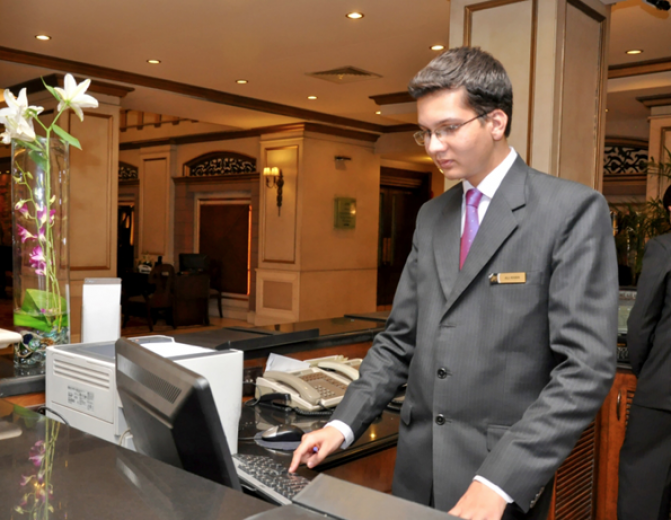1 10
1 10
ADVERTISEMENT
1. Connecting
The best way to make a repeat visitor out of a Millennial is through customer service that goes above and beyond the call of duty. Although Millennials are seldom seen without a smartphone or tablet, they are far from anti-social—in fact, they expect engagement wherever they are—in person or online. Smart hoteliers are making sure that their front desks are mobile enabled, allowing guests to check in quickly via tablets, and that front desk personnel are trained to engage with guests by making chit-chat, recommending activities and places to visit and even coming out from behind the desk to greet and chat with guests. The savviest hotels even have customer service folks wandering around in uniform, ready to make jokes, help with a heavy suitcase, suggest restaurants, lead guests to the gym or even just point out a lowly ice machine.
2. “Lobbying"
The hotel lobby is no longer simply a well-decorated space to pass through on the way to the elevator. Lobbies are increasingly being used by guests as venues for meeting people, whether that’s business contacts, fellow conference participants or family and friends. Hotel lobby design should be hip and clean, and should include plenty of seating areas as well as lots of recharging stations for laptops, tablets and smartphones. In addition, lobbies are increasingly being promoted as networking venues for hotel guests to get to know one another via coffee hours, afternoon teas, happy hours and wine tastings.
3. Mobile marketing and booking
Most people make reservations online, increasingly through mobile devices, and this trend will be around for a long, long time. That means hoteliers need to fast-track the booking process and make it as easily navigating and visually compelling as possible. Investing in smartphone apps is important. Millennials expect to see what they’re paying for, and high-quality videos and photos are a great way to showcase a hotel’s assets. With a strong online presence, hotels can create brand awareness, establishing their authority and gaining guests’ trust as well as interest. Social media sites like Facebook, Instagram, Hipstamatic and Pinterest are cheap and easy marketing tools for showing, not telling, travelers what they can expect to find in their accommodation and allowing them to participate through photo-sharing. Plus, the use of blogs, newsletters, webinars and even eBooks will keep guests engaged and helping to spread the word long after they’ve gone home.
4. Free WiFi
It’s hard to believe that there are still hotels that make guests pay for WiFi, which is something that Millennials won’t tolerate for long. This is, after all, the generation that grew up online. They believe everyone has a right to Internet access and that everything on the Web should be free, so to them, WiFi surcharges seem unnecessary, not to mention archaic.
5. Cloud-based systems
Cloud-based property management systems are good for hoteliers as well as their guests. With ease of access, the cloud gives hotel staff the ability to update in real time without bulky hardware, and lets guests back up their devices.
6. Food for foodies
Eating is all about health, quality, variety and value. Millennials expect gourmet, organic and artisanal foods, beverages and snacks. They also want refreshments that truly live up to their name--they’re just not satisfied with health bars and bottled water.
7. Workouts
It’s no longer enough to have a room stocked with bulky gym equipment somewhere in the hotel. Sure, Millennials use treadmills, but they also want exercise balls, state-of-the-art cardio machines and mixed-martial arts and yoga classes, even if they’re just the 10-minute “lift-your-spirit” variety.
8. Being green
Leave cards for guests to put out for the maid requesting that the towels and linen aren’t changed on a daily basis unless they’re truly soiled. Let your guests know if the hotel is LEED certified or the mattress doesn’t off-gas. And provide pump versions of soap, shampoo, conditioner and hand lotion rather than those tiny plastic bottles that end up in landfills. And if your hotel is doing anything else that’s green—say, planting trees to offset its carbon footprint, operating a rooftop garden or composting discarded food—let your guests know.
9. Walking about
Millennials are, above all, experiential. They’re also very independent. So rather than offer your guests bus tours, let them get to know the area themselves. Provide them with do-it-yourself experiences like walking tours that are historical, educational, fun or even all-out quirky.
10. Electronic check-ins
Travelers at some of the most forward-thinking hotels are now able to check-in in advance, the same way passengers can confirm flights and seating before arriving at the airport. Most of the hotels offering electronic check-ins are the bigger, more sumptuous ones at this point, but this trend is spreading. Here’s how it works: Guests who register as preferred customers are sent key cards equipped with identification that uses radio frequencies. On the day of the confirmed arrival, a text message is sent to the guest’s mobile device, including details like room number and timing. Upon arrival, the guest gets to skip the front desk and head straight to the room.

